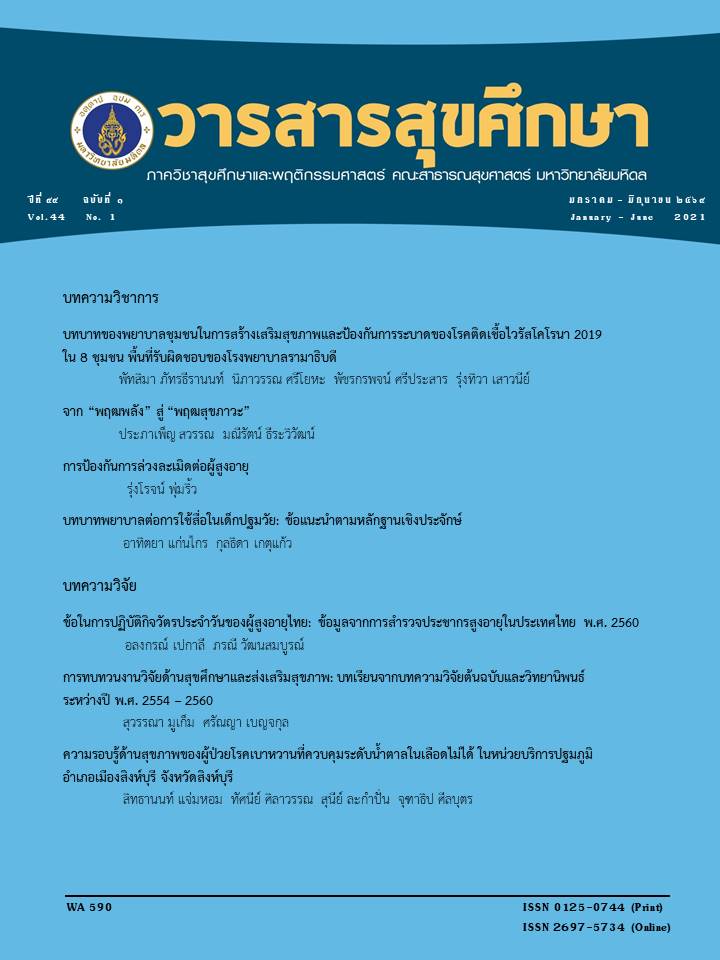Nurse’s Roles on Media Use in Early Childhood: Recommendations on Empirical Evidences
Keywords:
Digital media, Early childhood, Nurse role, RecommendationsAbstract
Media use in early childhood is rapidly increasing related to the global change.
Electrical technology affects to human life unavoidable. Especially, early childhood exposes to screen media starting before 2 years of age. Media use in early childhood is considered as a double-edged sword. If screen media is used unappropriated, it might affect child’s health and development in the future. Based on the empirical evidences, media use for children younger than 2 years is harmful than useful. Several impacts of early media use include physical activity, emotion, social interaction, communication, behavior, executive function, intelligence, leaning ability, health problem, and poor quality of life. To prevent adverse effects, nurses and healthcare profession have to advise parents and caregivers to use all electric media in appropriated handle. This article aims to present the recommendations of media use in early childhood. Nurse’s roles in applying the evidence base to prevent harmful consequence from media use in children is required. All child’ s caregivers need to collaborate and confederate in promoting media literacy. The important roles in child’s caregiver to limiting and monitoring media use in children and surveillance possible impact of electronic media use in order to minimize adverse effect and apply media use reasonably.
References
2. Hockenberry MJ, Wilson D, Rodgers CC. Wong’s essentials of pediatric nursing. (10th ed). St. Louis: Mosby; 2017.
3. Bronfenbrenner U. Ecological models of human development. In: Gauvain M, Cole M, (editors). Reading on the development of children. 2th ed. NY: Freeman; 1994. pp. 37-43.
4. พระราชบัญญัติกองทุนพัฒนาสื่อปลอดภัยและสร้างสรรค์ 2558
5. Chumprasert T, Wiroonpanich W, Wattanasit P. Relationships between the use of electronic media and the development of children aged 2-5 years in Public Child
Development Centers in Songkhla Province. The Southern College Network Journal of Nursing and Public Health 2019;6(2):91-104. (in Thai)
6. Tansriratanawong S, Louthrenoo O, Chonchaiya W, Charnsil C. Screen viewing time and externalising problems in pre-school children in Northern Thailand. Journal of Child &
Adolescent Mental Health 2017;29(3):245-252.
7. Vijakkhana N, Wilaisakditipakorn T, Ruedeekhajorn K, Pruksananonda C, Chonchaiya W. Evening media exposure reduces night-time sleep. Acta Paediatr 2015;104(3):306-312.
8. Ebbeck M, Yim HYB, Chan Y, Goh M. Singaporean parents’ views of their young children’s access and use of technological devices. Early Childhood Educ J 2016;44(2): 127-134.
9. Günüç S, Atli S. Parents’ views on the impact of technology on 18 to 24-month old infants. Addicta: Turkish J Addict 2018;5(2):205-226.
10. Webster EK, Martin CK, Staiano AE. Fundamental motor skills, screen-time, and physical activity in preschoolers. J Sport Health Sci 2019;8(2):114-121.
11. Zhao J, Zhang Y, Jiang F, Ip P, Ho FKW, Zhang Y, et al. Excessive screen time and psychosocial well-being: The mediating role of body mass index, sleep duration, and parent-child interaction. J Pediatr 2018;202:157-162.
12. Brockmann PE, Diaz B, Damiani F, Villarroel L, Núñez F, Bruni O. Impact of television on the quality of sleep in preschool children.Sleep Med 2016;20:140-144.
doi: 10.1016/j.sleep.2015.06.005.
13. Hinkley T, Carson V, Kalomakaefu K, Brown H. What mums think matters: a mediating model of maternal perceptions of the impact of screen time on preschoolers' actual
screen time. Prev Med Rep 2017;6;339-345. doi: 10.1016/j.pmedr.2017.04.015.
14. Supanitayanon S, Trairatvorakul P, Chonchaiya W. Screen media exposure in the first 2
years of life and preschool cognitive development: a longitudinal study. Pediatr Res
2020;1-9.
15. Yang Y, Jin Z, Liu S, Jin X, Huang H, Tong S. Children’s social communication skills and
electronic screen exposure, perinatal, and other risk factors. J Public Health 2019;1-9.
16. McNeill J, Howard SJ, Vella SA, Cliff DP. Longitudinal associations of electronic application use and media program viewing with cognitive and psychosocial development in preschoolers. Acad Pediatr 2019;19(5):520-528.
17. Hinkley T, Verbestel V, Ahrens W, Lissner L, Molnar D, Moreno LA, Bourdeaudhuij ID. Early childhood electronic media use as a predictor of poorer well-being: a prospective cohort study. JAMA Pediatr 2014;168(5):485-492. doi: 10.1001/jamapediatrics.2014.94
18. Anderson DR, Subrahmanyam K. Digital screen media and cognitive development. Pediatrics 2017;140(2):S57-S61. doi: 10.1542/peds.2016-1758C.
19. Chassiakos YLR, Radesky J, Christakis D, Moreno MA, Cross C. Children and adolescents and digital media. Pediatrics 2016;138(5):e20162593. doi: 10.1542/peds.2016-2593
20. American Academy of Pediatrics. Media and young minds. Pediatrics. Pediatrics 2016; 138(5):e20162591.
21. Bozzola E, Spina G, Ruggiero M, Memo L, Agostiniani R, Bozzola M, et al. Media devices in pre-school children: the recommendations of the Italian pediatric society. Ital J Pediatr 2018;44(1):1-5.
22. Jabbar SA, Al-Shboul M, Tannous A, Banat SA, Aldreabi H. Young children’s use of
technological devices: parents’ views. Modern Applied Science 2019; 13(2).
23. Ihmeideh F, Alkhawaldeh M. Teachers' and parents' perceptions of the role of
technology and digital media in developing child culture in the early years. Child Youth
Serv Rev 2017;77;139-146.
24. Canadian Peadiatric Society. Screen time and young children: promoting health and
development in a digital world. Paediatr Child Health 2017;22(8):461–468.
doi: 10.1093/pch/pxx123
25. World Health Organization. Guidelines on physical activity, sedentary behaviour and
sleep for children under 5 years of age. World Health Organization, web annex: evidence
profiles. 2019;No. WHO/NMH/PND/2019.4.
26. Chonchaiya W, Sirachairat C, Vijakkhana N, Wilaisakditipakorn T, Pruksananonda C.
Elevated background TV exposure over time increases behavioural scores of 18-month-
old toddlers. Acta Paediatr 2015;104(10):1039-1046. doi: 10.1111/apa.13067.
27. Chonchaiya W, Wilaisakditipakorn T, Vijakkhana N, Pruksananonda C. Background media exposure prolongs nighttime sleep latency in Thai infants. Pediatr Res 2017;81(2):322-328.
28. Lin LY, Cherng RJ, Chen YJ, Chen YJ, Yang HM. Effects of television exposure on
developmental skills among young children. Infant Behav Dev 2015;38:20-26.
doi: 10.1016/j.infbeh.2014.12.005



